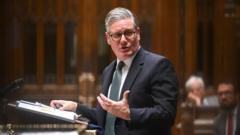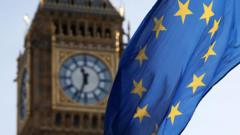Following a significant decrease in net migration, the UK government faces criticism for its tightening of immigration policies, reflecting broader concerns about national identity and integration.
UK Immigration Sees Dramatic Decline Amid Policy Shifts

UK Immigration Sees Dramatic Decline Amid Policy Shifts
Net migration in Britain halved in 2024, raising questions about the future of immigration policy under Prime Minister Keir Starmer.
In a significant turn of events, official data revealed that net migration to the UK plummeted by 50 percent in 2024, a statistic released Thursday indicating the end of a period characterized by rising immigration levels. The decline aligns with Prime Minister Keir Starmer's recent commitment to regain "control of our borders," cautioning against the perils of unchecked immigration and its potential to transform Britain into an "island of strangers."
The new figures, estimating net migration at 431,000 for 2024—down from 860,000 in 2023—point to a notable transition in the nation's immigration landscape, driven largely by restrictive measures implemented by the preceding Conservative government amid pressures to address the inflow of migrants post-Brexit. The shift raises probing questions about Starmer’s Labour administration, which has rolled out a series of policies intending to tighten migration rules even further.
Sunder Katwala, director of the migration think tank British Future, suggested the previous government effectively handed Starmer a reduction in migration figures that he can now claim credit for, despite the stark rhetoric regarding immigration. The oscillating statistics highlight a disconnection between public sentiment, heavily influenced by populist themes, and the actual realities of immigration flows.
The Office for National Statistics, which tracks migration trends, noted that after peaking at 906,000 in mid-2023, net migration fell approximately 20 percent over the ensuing year. The most recent estimates also underline a reduction in individuals arriving in the UK on work and study-related visas, coupled with a notable uptick in emigration—particularly from students who are now departing following the easing of pandemic restrictions.
These developments have reignited debates surrounding immigration policies and national identity, a discourse shaped profoundly since the 2016 Brexit referendum. With pressures mounting on Starmer's government to respond effectively to these immigration challenges, the future of Britain's immigration landscape remains uncertain as policymakers grapple with balancing economic needs and public perception.






















